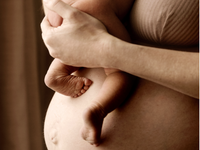Pregnancy loss is one of the most painful things a person can experience, and knowing how to navigate such a painful experience can be incredibly challenging. How do you work through it and move forward? How do you start to process what happened? And how do you take care of yourself, physically and emotionally, as you move through the healing and recovery process?
It's important to know that first, you're not alone. Second, talking to a therapist can help. In the meantime, one therapist shares tips on how to move through the grief and loss.
Give yourself permission to feel your feelings, whatever they may be.
A loss of any kind can bring up a lot of emotions, but a loss of a possible child can bring up very specific ones. And to navigate the loss, it’s important to give yourself permission to feel those feelings—whatever they may be.
“There is no ‘right’ way to experience emotions after a miscarriage,” reproductive and perinatal psychiatrist Dr. Carly Snyder, MD, says. “Many will go through feelings, depending on their personal situation—anything from grief, sadness, relief, fear, envy anxiety.”
Trying to suppress or ignore your emotions can make it more difficult to heal. It's important to create space to feel whatever emotions come up for you; for example, if you experience sadness, let yourself cry. If you experience frustration, let yourself feel it fully, without trying to rush through it.
Another important thing to note? While some people experience big emotions following a pregnancy loss, others don’t, particularly at first—and if you find yourself in that space, it’s totally normal. Just give yourself time.
“Some will feel nothing for a while, until the emotions finally hit,” says Dr. Snyder. “Feeling numb can be as common as having strong feelings after a miscarriage.”
As the saying goes, the only way out is through—and so in order to work through the emotions surrounding your pregnancy loss, you need to experience them.
“Feeling numb can be as common as having strong feelings after a miscarriage.”
Try to avoid shame spirals.
While it’s important to let yourself feel your emotions, if shame is the predominant emotion you’re experiencing, it’s important to remind yourself that you have nothing to be ashamed of.
“Some women feel they did something wrong to cause the miscarriage, leading to a sense of shame,” says Dr. Snyder. “Remember, you didn’t cause the miscarriage, and there was nothing you could have done to prevent it. There is no shame in losing a pregnancy.”
That being said, shame can be a hard experience to combat. So, if you’re struggling with shame after your pregnancy loss, you might consider seeing a therapist for support—even if the thought of therapy feels overwhelming.
“There is no wrong time to see a therapist,” says Dr. Snyder. “If you're struggling, find someone to talk to—or, if you already have a therapist, consider seeing them more often.”
Take a social media break.
Social media—and the comparisons that often come with it—can be hard for your mental health in the best of times. But when you’re navigating something as serious as a pregnancy loss, it’s best to avoid social media altogether.
When you’ve recently lost a pregnancy, chances are, reminders of other people’s pregnancies and/or children might feel triggering to you. And while you can’t avoid those reminders altogether, you can minimize your exposure by getting off social media for a bit.
“When grieving, it may seem like there are pregnant women or babies everywhere,” says Snyder. “While you can't avoid seeing people outdoors, you can reduce or eliminate exposure to baby announcements, family pictures and similar posts on social media.”
Consider avoiding the social media platforms until you’ve had time to process the loss and are feeling in a better place emotionally. And similarly, know that it's okay to say no or take a break from baby-centric events—like a friend’s baby shower or child’s first birthday party.
“Protect yourself by opting out of events that might overwhelm you with reminders of pregnancy and babies,” says Dr. Snyder.
Focus on getting sleep.
Navigating a pregnancy loss can be extremely difficult, both physically and emotionally—and in order to put yourself in the best position to deal with that difficulty, you need to prioritize sleep.
“This can be difficult when feeling especially sad or anxious, but adequate sleep is crucial,” says Dr. Snyder.
Good sleep is the foundation of health; everything is easier with a good night’s sleep. More specifically, getting high-quality sleep helps you better manage your emotions. This, in turn, can put you in a better position to feel, process, and heal—which is critical when you’re navigating such a serious loss.
Practice good sleep hygiene, like going to bed and waking up at the same time every day, avoiding caffeine after noon and turning off devices at least an hour before you go to sleep.
And if you’re not able to get good sleep on your own, it may be time to get some help. “If you're struggling, try a relaxation app, consider cognitive behavioral therapy (CBT) for insomnia or speak to your doctor about short-term medication options,” says Dr. Snyder.
Take your time—there's no rush.
Healing from pregnancy loss doesn’t happen overnight, which is why it’s so important to “take time to heal, both physically and emotionally,” says Snyder.
In the immediate days following your pregnancy loss, try to reduce stress and daily responsibilities as much as possible. For example, you might consider taking time off of work (some companies offer leave for people experiencing a pregnancy loss), asking a partner or friend to help care for any other children or ordering takeout instead of cooking.
Over the longer term, you’ll also want to give yourself time and space to grieve the pregnancy you just lost. It's okay to let yourself grieve and take a break before you start thinking about another pregnancy.
“Don’t rush into trying to conceive again until you feel physically and emotionally ready,” says Snyder. “Consult your OB/GYN about when it’s safe to start trying, and wait until you feel mentally stable.”
There’s no universal amount of time that it should take you to grieve and start healing from pregnancy loss; all you can do is take good care of yourself, feel your emotions, and reach out for support—and slowly, but surely, you will begin to process. But if you feel like you’re not able to bounce back, no matter how much time or space you give yourself, it’s important to talk to your doctor.
“If your mood remains depressed or you feel persistent anxiety that affects your ability to function, consider talking to your OB/GYN or seeing a reproductive psychiatrist to discuss whether medication, in addition to therapy, might be beneficial,” says Snyder.
Perelel is a proud partner of The HOPE Project, which aims to uncover some of the causes of pregnancy loss, so that we might be able to better predict pregnancy outcomes in the future. To learn about this mission and how you can get involved, visit here.
Next up: How to support your mind and body during a loss.

theFolio in Your Inbox
Sign up to receive doctor-backed, stage-specific content in your inbox each week.
This article is for informational purposes only. It is not, nor is it intended to be, a substitute for professional medical advice, diagnosis, or treatment and we recommend that you always consult with your healthcare provider. To the extent that this article features the advice of physicians or medical practitioners, the views expressed are the views of the cited expert and do not necessarily represent the views of Perelel.






















